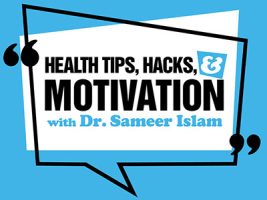Intermittent fasting is a lifestyle change that increases Human Growth Hormone and improves insulin sensitivity. There are three popular methods to do this:16-8-method, Eat-Stop-Eat-method and the 5-2-method. It may support cellular repair and in order to successfully practice intermittent fasting, five tips have been suggested. These tips include drinking plenty of water, staying busy and productive, consuming high volume foods, consulting your healthcare provider and the occasional consumption of coffee. Following these tips will aide in having successful intermittent fasting.
VIDEO HIGHLIGHTS
- Intermittent fasting involves reducing the amount of food consumed by skipping one or two meals.
- There are three main methods for intermittent fasting: 16/8, Eat-Stop-Eat and 5:2.
- When done correctly, intermittent fasting can lead to weight loss as well as improved insulin sensitivity and cellular repair in some cases.
- To make it easier to follow an intermittent fast, Dr Islam recommends drinking plenty of water; staying busy; eating high volume foods such as vegetables with fiber; adding coffee and giving it a try for 1 or 2 days at a time after speaking with your healthcare provider first.
FULL TRANSCRIPT
Intermittent fasting. You may have seen this everywhere. In fact, I’ve even talked about it in previous videos. So what exactly is intermittent fasting? Does the hype actually meet reality? Well, this video today, I’ll discuss what exactly is intermittent fasting. We’ll discuss different ways people can do intermittent fasting. What I have done in the past, we’ll explain the changes to the body that occurs when it comes to intermittent fasting.
And at the very end of the video, I’ll give you five tips on what I recommend on how you should try to implement intermittent fasting or to make it easier if you wanna try and do this. Guys, let’s talk about poop honey, y’all. Dr. Islam here, a k a, your poop guru, trying to give you the best tips and tricks so you can live your best life.
From the top all the way down to the bottom, you haven’t already, don’t forget to smash that like button. Live sharing, subscribe so you can get more videos like you’re watching. And don’t forget to subscribe to my newsletter where you can get great tips and tricks like you’re learning in today’s video. So what exactly is intermittent fasting? Well, when it comes to weight loss and dieting,
there are two main ways that we kind of think about when it comes to dieting. One is avoiding certain foods or minimizing the calories. The other way is just how we eat the patterns of what we eat. And when it comes to intermittent fasting, it delves into the second portion how we eat or eating pattern. In essence, the simplest explanation for intermittent fasting is that you are essentially skipping one or two meals.
That’s basically it. Either you’re skipping breakfast and fasting until lunch, or you’re skipping dinner and fasting until breakfast. You’re just skipping one whole meal. But the idea behind intermittent fasting is by skipping that meal, you’re able to not eat and minimize the amount of calories and even lessen the calories that you’re supposed to ingest during the day. Now, the good thing about intermittent fasting,
it’s not a diet in the normal sense. We’re not telling to restrict certain foods like eliminating carbohydrates or eliminating carbs, nor is it telling you what foods are good for you or what foods are bad for you. It’s basically a change in how you eat, a pattern of how you eat and it specifies when you should eat as opposed to what you should eat.
So how exactly should you do intermittent fasting? There are a lot of different ways that people do it. Save people fast for a couple of days and eat. So people skip a couple meals and different ways you can do it. But there are three conventional ways of how people do intermittent. Number one is the 16 eight method while you’re fasting for 16 hours and you’re eating only for that eight hour timeframe.
So the easiest way to do this is to just skip breakfast. So you eat lunch, you eat dinner, and you stop eating dinner and then you fast all the way until you have lunch the following day. Or you can do it the other way around where you skip dinner. So you have breakfast, have lunch, then you skip all the way around until you finally have breakfast again.
So you’re fasting for 16 hours and you’re eating for that small restricted eight hours. The second way is eat, stop, eat where you’re eating. Then you’re fasting for 24 hours, and then you’re eating again, fasting for 24 hours, then eating again. So with this method, you’re actually fasting for 24 hours. Next is the five two method. This is for two days.
You only consume five to 600 calories, so you’re really restricting the amount of food coming in. And then the other five days you eat normally all these methods are just fancy ways of doing the exact same thing. You’re just reducing calories. And that’s exactly what the whole point of intermittent fasting is, is that you’re actually reducing the amount of calories that you’re ingesting.
And I can guarantee you if you reduce calories, you’re going to lose weight. And this is the idea when it comes behind intermittent fasting. Now, I have found when I did intermittent fasting that 16 eight method is the easiest thing to do. You’re essentially just skipping one meal. And most people who do intermittent fasting do the 16 eight method because it’s really easy to do.
Just skip your breakfast, you’re already fasting throughout the night, and you can use that sleep when you’re not eating as part of your fast. It makes it so much easier. So what exactly is happening when you’re doing intermittent fasting? Now we are seeing a lot of evidence coming out on how restricting calories changes a whole plethora of items and things going on inside your body.
We’re seeing evidence that can make people live longer, live healthier, lose weight like we mentioned before. But also, how about with chronic conditions? I don’t wanna say this is a win for everybody, but we’re seeing a lot of evidence of how this is beneficial for you. Specifically, we have three main changes that do occur in the body. Number one,
human growth hormone or HCH jumps up almost fivefold whenever you’re fasting. And h e h is a way for us to lose weight and gain muscle. Number two, insulin sensitivity improves whenever you’re fasting. So this allows you to store fat more excessively and easier and internal will help you to lose weight. And number three, we’re seeing some evidence that you can have cellular repair when it comes to intermittent fasting.
Now, once again, the studies are early. We don’t know the science behind this, but we’re seeing evidence that you’re having better cellular repair whenever you’re doing fasting. All right? So you may be intrigued when it comes intermittent fasting, but you’ll be like, oh my gosh, Dr. Islam, that seems so hard. How can I not eat for 16 hours?
Here are my Russian bacon. Number one, you need to drink lots of water. Water will make you feel fuller longer and more often. I’m telling you, this works for me. Whenever I’m fasting and like, oh, I’m so hungry, I just drink water. It takes up space. It’s good for you and you don’t feel I’m hungry. Number two,
stay busy and productive. It is hard for me to do my fast on the weekends. I I, in fact, I will tell you I don’t do intermittent fasting during the weekends. I do it during the day when I’m at work. I’m busy, I’m doing other things. The distraction of work prevents me from thinking about my hunger. Number three,
eat high volume foods, lots of vegetables, lots of fiber. These foods stay in your stomach longer and more often to make you feel fuller. Number four, add coffee. Coffee or caffeine actually acts as a appetite suppressant. So sometimes whenever I crave that food and I’m feeling very, very hungry, I’ll have some coffee, black coffee, so I don’t break my fast to help out when it comes to those cravings.
And then number five, give it a try and see how you feel. You don’t have to do this all the time. I don’t do it all the time at all. I now do it on the occasional basis when I’m not feeling good, when I wanna spice things up, when I wanna get a jumpstart on how I’m feeling, it’s a great way for me to do this.
Now, like anything, when it comes to diet related, it’s important for you to speak to your healthcare provider before you implement something like intermittent fasting. It’s not for everyone. And there are some conditions in which it may not be best for you. So make sure you speak to your healthcare provider first when it comes to intermittent fasting. So here’s my call to action to you.
After you speak to your healthcare provider, try doing intermittent fasting for one or two days. See how you feel. Do this 16, eight method, skip breakfast, have lunch, have dinner, and just see how you feel. Do you have more energy? Do you feel more focused? Do you feel like your body’s doing better? I have noticed these effects whenever I do intermittent fasting.
And I’ll tell you, I bet you will feel those same effects as well. My question day for you, have you tried intermittent fasting? Has it worked? What worked? What hasn’t calmed down below? I will love to hear what you guys have to say. Wanna thank you for watching. Don’t forget to smash that light button, like sharing, subscribe,
and don’t forget to subscribe to my newsletter. We can get great tips and tricks like you’re learning in today’s video. Guys, man, thank you for watching. Don’t forget, let’s talk about poop. Thanks everybody.



